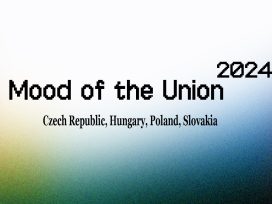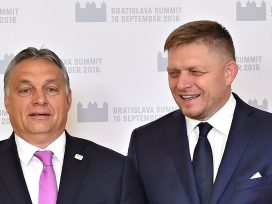Miklos Harazsti is a self-confessed optimist. Though the current odds would seem to be against it, in his job he needs to be. Since 2004 Harazsti has been the OSCE’s Representative for the Freedom of the Media (RFOM), responsible for monitoring the media and fostering its progress in countries within the organization’s remit. He acts as a watchdog to provide early warning on violations of freedom of expression in participating states and encourages compliance with its norms, which at times, for all his very considerable efforts, seem more aspirational than real.
One might legitimately ask why an organization dedicated to conflict prevention, crisis management and post-conflict rehabilitation created during the Cold War era as an East-West forum, should decide in mid life to take the media into its remit. In the words of Haraszti’s predecessor and founder of the media office Freimut Duve: “Without an independent professional media and an independent professional law system to act as a balance to the constitutional basis of each of the participating states, there can be no future for democracy and security in the OSCE region.” Duve’s conviction stemmed from his awareness of the instrumentalizing of the German press under the Nazis; as the editor of a samizdat publication in communist Hungary, Haraszti, has an even closer personal experience of an undemocratic, totalitarian media.
We have met at the OSCE headquarters in Vienna to discuss the state of health of his patients in the former communist countries of southeastern and central Europe (CEE). Twenty years after the fall of the Wall and ten since the foundation of the RFOM office, many would say the media in these countries are on a downward spiral despite the money that has gone into the region on this front.
So how does he see things in the brave new post-communist world? And where does he think ten years of monitoring, cautions, cajoling and protests has got us? How “free” is the media in the “new democracies”? Has there been progress, or is my impression that things were going in the opposite direction justified?
“It’s a changing landscape,” he says reflectively, “with few high points.” I remind him of the concern he expressed recently over the fact that many of the countries in his territory were questioning the “universality” of the OSCE’s commitments and spoke of “the meltdown of the consensus of the press”. Was he implying that things were going backward? What were those commitments?
“Ten years ago, the establishment of this office marked a moment when all participating states committed themselves to the universal values of democracy, including the protection of free expression and media pluralism. Today, just as in the days before the formation of the OSCE, different interpretations of democracy are being cultivated again. The same is true of the right to speak out,” he said. “We had a window of opportunity in which no participating state in the northern hemisphere opposed these values or saw them as foreign, imposed or humiliating. Today, there is an increasing relativism at the top: the word may have a certain universality in practice, goes the argument, but the values associated with it should have a local relevance. In Russia, for example, this home-grown version of democracy is known as ‘sovereign’ democracy. If the concept is challenged, it’s defended on domestic grounds – that this is a more relevant and ‘orderly’ version of the norm appropriate to local circumstances.”
“The Kremlin was badly alarmed by what it saw as the ‘chaos’ of the ‘colour revolutions’ in former Soviet territories such as Ukraine, Georgia or Kyrgystan. They put much of the responsibility for this on the role of the media and civil society in these places and have increasingly excluded the one and reasserted control of the other.”
In January this year, Haraszti warned of the “spiralling violence” against journalists in Russia. It’s a subject he cares about passionately, regardless of where it is happening: “There is only one thing more intimidating to free speech than harassment, physical attacks and murder of media workers, and that is when governments tolerate harassment, attacks and murder.” In his letter to Russia’s President Dmitry Medvedev and Prime Minister Vladimir Putin to protest the latest wave of murders of journalists in the country and the impunity of their attackers, he wrote: “The tendency to resort to physical intimidation of journalists resumed in the last months of 2008. I am saddened to see that this trend has intensified in 2009,” and urged “concerted, centralized government action” to resolve what he called a “chronic human rights crisis”. Freedom of the media, he says now, “remains an empty assurance in any country where journalists who discuss important issues are being killed and their murderers remain unpunished. Impunity encourages this type of crime, makes it fashionable. Free media annoys organized crime and anyone engaged in corruption. Then there are those who order the attacks: bringing them to justice is the only treatment for this disease.”
And it is a real disease, not only in Russia but in the Balkans, for example. He points to the poisonous mix of “nationalist sentiment” that allows journalists to be punished for a lack of “patriotism” in Serbia, or the alleged mafia involvement in the murder of journalist and publisher Ivo Pukanic in Croatia in October 2008. I remind him of the vicious attack on Bulgarian investigative journalist Ognyan Stefanov in September 2008 that followed shortly after the murder of fellow journalist Georgi Stoev in April. All these murders remain unsolved. Despite what Haraszti calls “the proper reaction of those at the highest level” at the time, no one has been brought to book and the investigations appear to have gone cold.
Which brings us back to the corrupting effect of “relative values” and why he places a particular emphasis on this. Why is this breakdown happening now? What are the particular dangers for the media? In essence, he stresses, “It is directed against international scrutiny of human rights and media freedoms, on the grounds that this represents foreign intrusion in national affairs; it fragments universal standards into national ones and annihilates the notion of an international and intergovernmental media watchdog.” With no universal standard of behaviour to appeal to in these countries, there is little he can do to defend the interests of local journalists and media organizations who are abused and intimidated by their governments. It also vitiates his efforts to address complaints that arrive in on his desk from journalists.
Nor it seems is the West innocent of “this fragmentation of international standards”. In the wake of the 9/11 attacks in the US, “we have seen the proliferation of tailor-made forms of speech bans – on the Internet, on historical issues, on hate speech – that penalize whatever governments find incorrect.” But if the US has, in the words of its founding father Benjamin Franklin, “sacrificed a little essential liberty for a little temporary security”, how have the older democracies of western Europe responded to this? And how has anti-terrorist legislation affected journalists?
“In Europe, some of the consequences of the security scare are worse than in the US, particularly when it comes to official anxiety on the publication of sensitive security data by journalists. This has led to an erosion of free speech standards, namely an attack against the right of journalists to protect their sources. European data retention laws are currently another cause of anxiety to European journalists. In Russia and the CIS, the concern with security has become the pretext for the passage of laws against ‘extremism’ on the grounds that this is conducive to terrorism. These have been used to silence civil organizations and the media. It’s all too reminiscent of the old days…”
It is situations such as this that test his optimism, but he was proof to my repeated challenge: “I believe not only that we need to be optimistic, but that we can allow ourselves to be. The idea of a free press, of a press that is not dependent on government, is taking root. What we are currently watching is a government counter-revolution against diversity in the mass media, and there we are only scoring defeats at the moment. But this is not happening with the blessing of civil society,” nor, he might have added with that of the many journalists and independent media outlets in the region who continue to fight government attempts to recover control of the media. So maybe his grounds for optimism were justified. But then he makes an interesting observation – tongue-in cheek, as he points out hastily, but none the less percipient for all that. “Oil revenues and media freedoms don’t go well together!”
“If you compare the state of the Russian economy today with that immediately after the end of communism when the state couldn’t even pay bureaucratic wages it’s a different world. Suddenly the state coffers benefited from the inflated oil prices in 2007 and 2008, people felt the benefit and no one wanted to rock the boat. I’m not saying that journalists are bought up out of the oil revenues, but only those journalists who have extremely strong principles would criticize the government simply because criticizing the government is not popular with the public. It could happen anywhere,” he muses, “even in the richer, older democracies.”
But the optimism resurfaces: “I’m quite sure that all these restrictions within the media will backfire the moment these governments begin to lose some of their popularity. Journalists, as representatives of civil society, will take their revenge. If you measure success by how deeply ideas are anchored, are rooted in civil society, in that respect we are making progress. In the past ten years, for instance, eastern Europe has begun to take on board ideas such as the protection of sources, freedom of information and the decriminalizing of libel and defamation. Even though the laws that would establish compliance with these basic rules are still a way off, societies have leaned they are entitled to information from government and sooner or later that will produce the laws if only to avoid conflict.” He reminds me that in 2006, the RFOM convinced the Council of Europe to adopt the decriminalization of libel and defamation as a standard, and that we should be seeing this put into effect. But he reiterates his earlier concern: “Right now journalists have a bigger problem: they are intimidated by violence and physical threat. That is the dominant cause of self-censorship and works against investigative journalism.”
I’m curious to know if he thinks foreign ownership of the press in the new democracies can have a beneficial impact on many of the problems he’s raised. Contrary to the welcome the western European media conglomerates such as WAZ, Springer, Bertelsmann and others were given in the early 1990s, foreign ownership has become a contentious issue: media organizations such as the European Federation of Journalists have raised fears that the encroachment of western media conglomerates into these countries has prevented, or at least hampered the growth of independent nationally-based media groups. Furthermore, given the absence of efficient journalists’ unions in many of the countries concerned and the hold exercised by these media moguls and their financial clout, the threat to journalists’ professional and social rights is growing. Members of the European Parliament have reiterated the need for a commitment to diversity of ownership and pluralism as EU values.
But Haraszti disagrees strongly. “The arguments advanced for recovering ownership of the national media are not unlike those used by governments who challenge the universality of democracy or free expression. ‘Give us back our media,’ they cry, and cite loss of sovereignty and so on, but it’s often little more than a ruse to get control back into their hands, or into the hands of local oligarchs who are not interested in the media except as a source of power. Better the foreign owner than the local oligarch; better investment from professional media company than say, from local banks, local oil companies, local energy companies, each with their own media for their own ends in which they can intimidate and censor their journalists. On the contrary: providing that it is subordinated to monopoly legislation, and that market plurality is ensured, then foreign ownership can be a positive thing. It’s not simply a matter of new standards or new technology: nationalist, intimidating, hate journalism is not found in any of the foreign-owned media in the democracies east of Vienna. I mention hate speech because it is, specifically, the language of those who agitate against foreign ownership. Xenophobia in the media business is always tied to the ideology of retaining state ownership, and governments make a virtue of their worst instincts…”
In any case, he might have added, given the extent to which the media has become increasingly globalized since 1989, the move was unstoppable, particularly in the audiovisual sector, where satellite technology has brought the world to the remotest villages across the region. He had a poor opinion of the trivia and lowest common denominator style of entertainment put out by most commercial TV stations in much of CEE, and deplored the widespread tabloidization of press and audiovisual services encouraged by the increasingly cutthroat competition for ratings and advertising. It is a process we are likely to see aggravated as the global financial crisis starts to bite deeper into eastern central Europe and corporations cut down on advertising. Media owners will, inevitably, go for the cheapest option; many outlets are in danger of disappearing altogether. But I was more interested in where this left Public Service Broadcasting, what Haraszti calls “the founding father of the democratic media and an essential mainstay of democracy itself”.
It’s no secret that in most of the countries we are discussing, PSB is in dire straits, cash-strapped and driven to ever diminishing returns on its remit by the unequal competition with the commercial sector for those vital ratings and consequent revenue. PSB is in crisis throughout Europe; even the BBC has its problems in the rapidly changing broadcasting landscape; its current financing from government via the license fee is under attack from a variety of sources and radical change is forecast at the next funding round. Some of this has been spurred by the growing significance of digital technology and the movement of audiences to the Internet, but it is provoking more fundamental questions about forms of financing PSB as well as its distinctive function in the face of ever greater choice. But the problem in the post-1989 democracies is more acute. If Haraszti is to be believed, and he has written on the subject at some length, PSB in these countries was more or less strangled at birth as a result of the simultaneous introduction of private, commercial stations and the “passionate manoeuvres” of governments to keep the newly established PSBs under their control. It has never recovered from the trauma and urgent measures are now needed if it is to survive the continuing machinations of government and the financial downturn, and return to the purpose for which it was intended: public information and debate, education and enlightenment in the forms and functioning of democracy.
Haraszti has spent considerable time looking into sustainable and effective forms of financing PSB, but before talking about that, he wants to stress why he thinks a viable PSB is essential in CEE. “Post dictatorial democracies are by nature weak. Voters need an infrastructure of objective, reliable, fair news; more trustworthy than that offered by parties or governments. They need the information on which they can base choices in free elections. If you doubt this, let me give you two numbers that prove the point: 1933 and 1948. Democracy can disappear. It happened under the fascists in the 1930s and again under the communists in the 1940s here in Europe. Radio and later TV became the propaganda tools used to wash democracy away. The reason the idea of BBC-style PSB caught such fire on the continent was because of the memory of totalitarianism. PSB was adopted in western Europe after 1945, in eastern Europe after 1989 and in Central Asia during the second wave of democratization. We rarely have such a well proven case: PSB is a protection for weak democracies.”
So why have things gone so wrong? “The crisis confronting PSB in the new democracies takes many forms: political intervention, the struggle for audience share, the nature of its programming and its purpose and legitimacy. All of which is encapsulated in its chronic financing crisis. Tax-payers won’t pay for a channel that gives them worse entertainment than the commercial channels and in which the voice of official propaganda is all too evident.” PSB, it seems, has become a political football: voters don’t want to pay for a channel they rarely watch and politicians in search of votes tend to take their part. So what’s the solution?
“If PSB is to have a future – and I believe it must – we need a complete reform of the funding system, secure, long-term finance that is ring-fenced and releases it from the need to compete with the commercial sector.” He dismisses the EU’s fixation with charging a fee – “it doesn’t work in the East” – and is equally opposed to the current idea of selling off PSB to commercial channels. The solution he offers has the virtue of simplicity: give the commercial channels a free run on advertising revenues and make them pay in the form of a fixed rate levy that would go to PSB. Complemented by a fixed annual deduction from taxpayers, this should liberate PSB from commercial pressures and enable it to get back to its proper remit securely and with greater political independence. He offers Hungary as an example of a country currently in the process of reforming its PSB financing along these lines. “We may not have had a proper transition from state-owned to public broadcasting, but we certainly haven’t had a reversal – however precarious its present situation, the idea of PSB has taken root.” He speculates that another way forward in this digital age is the US C-Span system. “This is a completely advertising-free, politically neutral PSB channel funded by the cable companies that provide it from the license fee paid by subscribers.”
“And the good news is that digitalization is on the way. The proliferation of digital channels has its dangers, but if the above method of financing is accepted, there will be more channels and an increase in commercial dues to PSB. And in the digital era a public service broadcaster that is the recognized supplier of reliable news and educational programmes becomes more important than ever.
“It will take time, but I am optimistic. We are standing on the threshold of a totally unknown new era. If PSB was originally a protection against totalitarianism, it will evolve into a protection against too much information, become an antidote to the loss of journalistic ethics and unmediated, unedited information on the Internet for instance. We don’t know how this will evolve, only that it will. We are on the verge of all media moving online: some of the press has already abandoned print; every day new forms of broadcasting are invented on the Internet. There will be attempts at regulation; Europe’s new Audiovisual without Frontiers Directive is one such. It aims to deal with television content on the Internet and is already outdated. You can’t apply the bad old broadcasting content regulations in the world of You-Tube; they won’t work. Media has ceased to be a national phenomenon and it is impossible to regulate it by these arbitrary methods. If we are optimistic it will evolve its own forms of self-regulation just as the print media did.”
Not that all the problems will thereby be solved, as he is the first to admit. His resources are limited – 0.6 per cent of the total OSCE budget, which on 2008 figures brings it to something under 1m euros – and the tasks do not get less. Populism and nationalism are alive and well in eastern central Europe and reflected in the media. Economic hardship and the resentment that accompanies unresolved political issues are the breeding ground for extremism and of the authoritarian governments Haraszti so much fears. The past twenty years may have instilled certain concepts and they will be hard to “wash away” a second time. But old habits die harder: there is, as yet, no contract between a cowed, often compliant and frequently unprofessional media and meddling politicians. There may be a media watchdog committed to changing all that, but the media itself is not yet the watchdog on power it needs to become if democracy itself is to thrive.
Judith Vidal-Hall met Miklos Haraszti, the Organization for Security and Cooperation in Europe Representative for the Freedom of the Media, in Vienna in November 2008.






